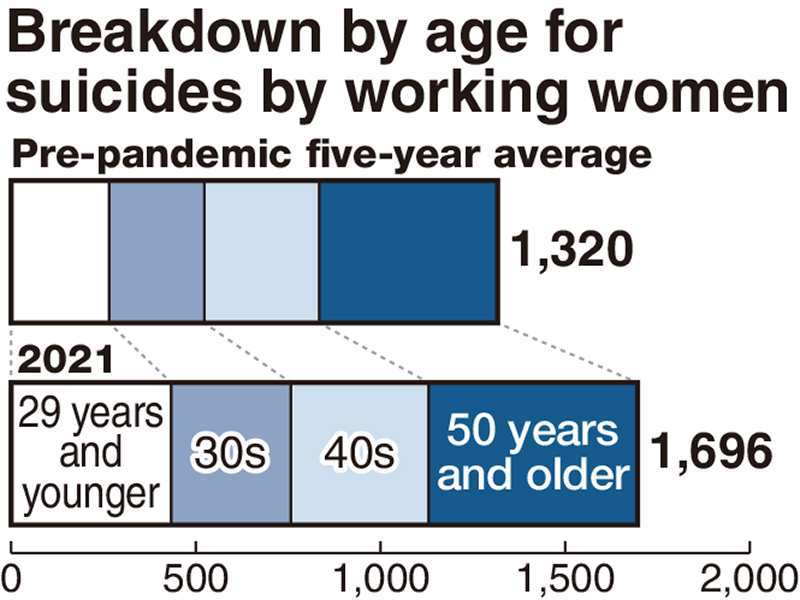
14:34 JST, October 15, 2022
The number of working women who committed suicide in 2021 increased by about 30% compared to the five-year average from 2015 to 2019, before the outbreak of the COVID-19 crisis, according to the government’s white paper on suicide prevention released Friday.
The 2021 figure of 1,696 was down slightly from the 1,706 suicides in 2020, when the coronavirus began to spread. However, the Health, Labor and Welfare Ministry believes that women, many of whom are non-regular workers, are still concerned about losing their jobs or suffering from decreased income during the pandemic.
The overall number of people who took their lives in 2021 was 21,007, down 0.4% from the previous year. The figure for men was 13,939, down for the 12th consecutive year, but the number for women, 7,068, recorded an increase for the second year in a row.
The white paper found that the number of working women who killed themselves in 2021 climbed 28% from the 2015-19 average of 1,320. By age group, a 64% increase was seen for those in their 20s, while suicides among those in their 50s rose 28%.
According to the government’s Labor Force Survey in 2021, excluding executive posts, non-regular workers, including part-timers, accounted for 22% of male employees and 54% of female employees.
It is believed that female non-regular workers have been more strongly affected by the deteriorating economic situation since the start of the pandemic.
The white paper looked at not only the women’s professions but also whether they lived with others, such as spouses or children, a factor that influenced the survey results for men.
The number of suicides among men who had people living with them was 8,399, down 12% from the five-year average. However, the number for men who lived alone was 5,068, almost the same as the five-year average, with suicides among those in their 20s and those 70 and older increasing more than 10%.
The white paper pointed out that those who lived alone often had no other people around them to provide advice or moral support, a situation worsened by restrictions on social activities brought about by the pandemic.
Top Articles in Society
-

Man Infected with Measles Reportedly Dined at Restaurant in Tokyo Station
-

Man Infected with Measles May Have Come in Contact with Many People in Tokyo, Went to Store, Restaurant Around When Symptoms Emerged
-

Woman with Measles Visited Hospital in Tokyo Multiple Times Before Being Diagnosed with Disease
-

Australian Woman Dies After Mishap on Ski Lift in Nagano Prefecture
-

Foreign Snowboarder in Serious Condition After Hanging in Midair from Chairlift in Nagano Prefecture
JN ACCESS RANKING
-

Japan PM Takaichi’s Cabinet Resigns en Masse
-

Japan Institute to Use Domestic Commercial Optical Lattice Clock to Set Japan Standard Time
-

Israeli Ambassador to Japan Speaks about Japan’s Role in the Reconstruction of Gaza
-

Man Infected with Measles Reportedly Dined at Restaurant in Tokyo Station
-

Videos Plagiarized, Reposted with False Subtitles Claiming ‘Ryukyu Belongs to China’; Anti-China False Information Also Posted in Japan
























